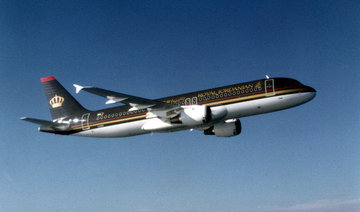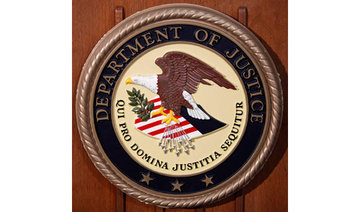JEDDAH: Thousands of passengers traveling on nonstop flights to the US from Saudi Arabia and seven other Middle Eastern and North African countries are now banned from carrying electronic devices on board.
The ban, issued by the US Department of Transportation, targets 10 international airports. It is set to exclude smartphones on board, but will apply to laptops, tablets, portable DVD players, electronic readers and cameras.
Following a similar move, the UK is due to announce a ban on laptops and other electronics on certain flights, the BBC reported, adding that the “UK restrictions may differ from the US Department of Homeland Security’s ban.”
Saudi Airlines (Saudia), which operates nonstop US-bound flights from King Abdulaziz International Airport in Jeddah and King Khalid International Airport in Riyadh, received the information from the General Authority of Civil Aviation, and will abide by the new laws as of Wednesday.
“The US transportation authorities have implemented new procedures on US-bound flights which include taking any laptops, iPads and Kindles (electronic readers), with their carry-on baggage,” Saudia said in a statement sent to Arab News. “These devices can be accepted as part of checked-in luggage only.”
Saudia spokesman Mansour Al-Badr told Arab News: “We do not know the reasons behind the ban.”
A Homeland Security statement sent by the US Embassy in Riyadh to Arab News on Tuesday said the “US Government is concerned about terrorists’ ongoing interest in targeting commercial aviation, including transportation hubs over the past two years.”
The statement cites the 2015 airliner downing in Egypt, the attempted airliner downing in Somalia last year, and the 2016 armed attacks against airports in Brussels and Istanbul.
“Evaluated intelligence indicates that terrorist groups continue to target commercial aviation, to include smuggling explosive devices in various consumer items,” the statement said. The Transportation Security Administration (TSA) has determined that it was “prudent to enhance security.”
The ban applies to nonstop flights to the US from international airports in the cities of Riyadh, Jeddah, Dubai, Abu Dhabi, Cairo, Amman, Kuwait City, Casablanca, Doha and Istanbul. About 50 daily flights will be affected, an unnamed US official told the Associated Press (AP).
The Homeland Security statement said airlines flying from the 10 determined airports were notified on March 21 at 8 a.m. (EDT) and expected to comply within 96 hours.
The UAE’s Emirates, which flies to New York, Washington, Chicago and Los Angeles, told AP on Tuesday that the ban would take effect on Saturday.
Egyptian officials at Cairo International Airport said they did not receive any instructions to ban passengers from carrying laptops, tablets and cameras on board, AP reported on Tuesday.
Royal Jordanian airlines previously issued a statement on Twitter instructing its passengers to abide by the electronics ban, before deleting it later, posting: “Further updates will be announced soon regarding #electronicsban.”
“I’m really still not convinced with this new law,” Zeina Sharawi, a Saudi Ph.D. candidate in Washington DC, told Arab News. She said using electronic devices is routine on long-haul flights, especially when flying with children.
“I’m really worried about putting my laptop in the baggage and have it get damaged or stolen, since I have all my important files and research articles, personal pictures and videos in it. I’d rather if they inspect it at the airport and keep it on board with me instead of keeping it in the baggage.”
Anas Abbas, a Jordanian studying English literature in Minnesota, told Arab News that he might resort to sending his electronic valuables via a secure parcel delivery service instead of packing them in his suitcase: “Instead of having my precious devices (checked in), as traveling without them is impossible and the chance of getting them lost is irritating… I might use DHL to receive them without any possibility of losing any bag.”
An alternative solution to bypass the new procedure is to have a layover at an airport in Europe on the way to the US. Abbas said if he is traveling from Amman, he could book a flight to Paris, for example, before connecting to a flight to the US. “That way I can get all my devices in my (carry-on) luggage.”
US bans electronic devices on flights from eight Middle Eastern countries
US bans electronic devices on flights from eight Middle Eastern countries

Eastern Region’s green initiative shows remarkable progress

- Initiative has focused on introducing climate-appropriate trees and flowers
- Eastern Province Municipality emphasized the project’s collaborative nature
DAMMAM: Significant strides were made by the Eastern Province Municipality last year in its efforts towards vegetation expansion and anti-desertification.
The initiative, designed to counter industrial pollution, improve air quality and move towards environmental sustainability, has focused on introducing climate-appropriate trees and flowers while adhering to scientific afforestation guidelines and controls.
Throughout the year, the municipality launched 87 initiatives involving more than 1,200 volunteers across 60 parks. This included the Dammam Corniche waterfront and its walking trails where some 680,000 trees and shrubs were planted, complemented by 7.7 million flowers, expanding green coverage by 205,000 sq. meters.
Work was also carried out to rehabilitate streets and other spaces, while technical upgrades included maintenance work on 200 pumps and the installation of irrigation networks covering 30 km of streets.
There was also progress for the park investment program, with four parks already under investment management and 400 more designated for future opportunities.
The municipality emphasized the project’s collaborative nature, highlighting the active participation of community members, government bodies and the private sector companies. Its inclusive approach aims to cultivate a lasting environmental consciousness and ensure sustainability practices are passed down to future generations.
Riyadh to host second edition of Model of Care Forum

- Forum aims to introduce the Saudi healthcare model locally and internationally, highlight success stories, and outline future goals and ambitions
- Forum represents the second phase in a four-part strategic process in the healthcare sector’s transformation
RIYADH: Riyadh will host the second edition of the Model of Care Forum under the patronage of Minister of Health Fahad Al-Jalajel.
Organised by the Health Holding Co. on Jan. 28-29, the forum will be held at Malfa Hall in Prince Mohammed bin Salman Nonprofit City.
The forum aims to introduce the Saudi healthcare model locally and internationally, highlight success stories, and outline future goals and ambitions in line with the Saudi Vision 2030.
It also promotes partnership in healthcare among individuals and their families by taking necessary measures to maintain their health, ensuring the provision of healthcare that meets societal needs according to the highest quality standards.
The forum represents the second phase in a four-part strategic process in the healthcare sector’s transformation, aimed at developing the healthcare model in the Kingdom.
The Health Holding Co. is playing a key role in enabling healthcare delivery through 20 health clusters across Saudi Arabia.
Directorate imposes new exit visa requirement

- Directorate addressed employers, stating that if a resident identity is valid for fewer than 30 days, the final exit visa may not be issued
- Resident identity must be renewed for the issuance of the final exit visa
RIYADH: The Saudi General Directorate of Passports has said that resident identities must be valid for at least 30 days when applying for a final exit visa.
The directorate addressed employers, stating that if a resident identity is valid for fewer than 30 days, the final exit visa may not be issued. In that case, the resident identity must be renewed for the issuance of the final exit visa.
It noted that if a resident identity is valid for more than 30 days and fewer than 60 days, a final exit visa may be issued for the resident identity’s remaining period.
If the resident identity is valid for 60 days or more, the final exit visa may be issued for 60 days only.
The directorate noted that employers may issue final exit visas for their sponsored workers or affiliated family members through the Ministry of Interior’s Absher Business platform, and the Muqeem portal.
Saudi king and crown prince congratulate Joseph Aoun on being elected president of Lebanon

- In a congratulatory cable, King Salman wished Aoun success and the Lebanese people further progress and prosperity
RIYADH: Saudi Arabia’s King Salman and Crown Prince Mohammed bin Salman congratulated Joseph Aoun on being elected president of Lebanon on Thursday.
In a congratulatory cable, King Salman wished Aoun success and the Lebanese people further progress and prosperity.The crown prince sent a similar cable.
Lebanon’s parliament voted Thursday to elect the country’s army commander, Joseph Aoun, as head of state, filling a more than two-year-long presidential vacuum.
Thursday’s session was the 13th attempt to elect a successor to Michel Aoun, whose term ended in October 2022.
King Abdulaziz Public Library launches Thara Saudi, Athar initiatives

- Through Thara Saudi the KAPL offers a number of programs that contribute to highlighting cultural tourism
- Athar is an interactive platform inspired by one of the pioneering national documentation projects, “The Encyclopedia of the Kingdom of Saudi Arabia”
RIYADH: General Supervisor of the King Abdulaziz Public Library Faisal bin Abdulrahman bin Muammar launched the Thara Saudi and Athar initiatives at the third Saudi Tourism Forum in Riyadh.
Through Thara Saudi the KAPL offers a number of programs that contribute to highlighting cultural tourism, while Athar is an interactive platform inspired by one of the pioneering national documentation projects, “The Encyclopedia of the Kingdom of Saudi Arabia.”
Speaking at the launch, Muammar said: “The Thara Saudi Arabia is the initiative through which the library seeks to provide a distinctive cultural tourism experience that reflects the rich and diverse history and culture of the Kingdom and aims to present a sustainable vision that contributes to enhancing local culture in global languages.
“It comes as an expression of the efforts of 40 years of cultural and cognitive work, which created a national legacy and a sustainable impact,” added Muammar.
He said the KAPL also launched the Athar initiative, which represents the historical monuments and landmarks mentioned in the encyclopedia of Saudi Arabia, enabling tourists to discover the Kingdom in an unprecedented way.
This project is designed to enhance the Kingdom’s position as a global destination for cultural tourism, and reflects the great diversity Saudi Arabia enjoys.
Through its pavilion at the Saudi Tourism Forum, which was held from Jan. 7-9 at the Riyadh Front, the KAPL seeks to enhance cultural awareness and provide knowledge content that contributes to highlighting the Saudi national heritage, and encourages the exploration of the Kingdom’s unique cultural destinations.
In November the KAPL launched an initiative to position Saudi Arabia as a top global destination for cultural tourism by attracting visitors worldwide to explore the library’s diverse branches.
This project aligns with the Kingdom’s Vision 2030 by strengthening national identity, fostering cultural exchange, and supporting sustainable development.
Through its efforts, the KAPL seeks to showcase Saudi Arabia’s rich heritage, folk arts, and traditions, while deepening citizens’ connections to their cultural roots and contributing to economic diversification.























